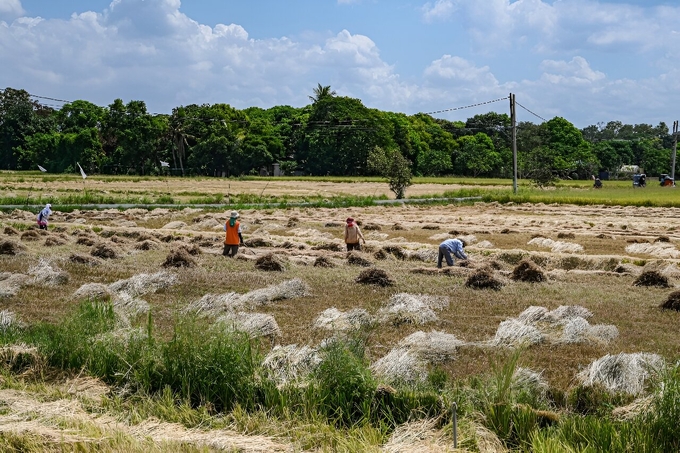May 21, 2025 | 08:53 GMT +7
May 21, 2025 | 08:53 GMT +7
Hotline: 0913.378.918
May 21, 2025 | 08:53 GMT +7
Hotline: 0913.378.918

Farmers work in a rice field in Bulacan in the Philippines.
The Philippines was the first country in the world to approve golden rice, which is enriched with the Vitamin A precursor beta-carotene and has a bright yellow color, in a bid to combat childhood blindness.
However, the Court of Appeals in Manila revoked a biosafety permit for commercial production of the rice granted by government regulators in 2021 after 14 opponents filed a challenge.
The court's ruling, issued on April 17 and seen by AFP on Thursday, also applies to a genetically modified eggplant, BT eggplant, that is pest resistant.
"By reason of the conflicting scientific views and uncertainties on the risks and effects of Golden Rice and Bt Eggplant, potential severe and grave threats to the welfare of people and the environment arise," the court said.
Commercial propagation was not allowed "until such time that the concerned respondent government agencies submit proof of safety and compliance with all legal requirements", it said.
Experts hope the rice will help combat childhood blindness and save lives in the developing world.
World Health Organization data show vitamin A deficiency causes up to 500,000 cases of childhood blindness every year, mostly in developing countries, with half of those dying within 12 months of losing their sight.
Golden rice was developed over two decades by the Philippines-based International Rice Research Institute (IRRI) and the Department of Agriculture-Philippine Rice Research Institute (PhilRice), while BT eggplant was developed by the University of the Philippines Los Banos campus.
The scientists involved insist both are safe to eat. PhilRice executive director John de Leon said in a statement the institute was "reviewing the implications" of the ruling to prepare its response.
The IRRI said it would continue to work with PhilRice on "developing safe and effective nutritional interventions through rice research".
It also said golden rice had received "positive food safety evaluations" from regulators in Australia, New Zealand, Canada, and the United States.
However, the rice faced strong resistance from environmental groups opposed to genetically altered food plants and at least one test field in the Philippines was attacked by activists.
The opponents who filed the objection, including Greenpeace, welcomed the ruling.
"This decision is a monumental win for Filipino farmers and Filipino people who have for decades stood up against genetically modified crops," Greenpeace Southeast Asia campaigner Wilhelmina Pelegrina said in a statement.
"GM crops have never been proven safe, and have hindered necessary progress on climate resilient ecological agriculture that keeps the control of seeds on our farmers."
Ordinary rice, a staple for hundreds of millions of people, particularly in Asia, produces beta-carotene in the plant but it is not found in the grain.
(AFP)

(VAN) Attempts to bring down the price of the Japanese staple have had little effect amid a cost-of-living crisis.

(VAN) Fourth most important food crop in peril as Latin America and Caribbean suffer from slow-onset climate disaster.

(VAN) Shifting market dynamics and the noise around new legislation has propelled Trouw Nutrition’s research around early life nutrition in poultry. Today, it continues to be a key area of research.

(VAN) India is concerned about its food security and the livelihoods of its farmers if more US food imports are allowed.

(VAN) FAO's Director-General emphasises the need to work together to transform agrifood systems.

(VAN) Europe is facing its worst outbreak of foot-and-mouth since the start of the century.

(VAN) The central authorities, in early April, released a 10-year plan for rural vitalization.